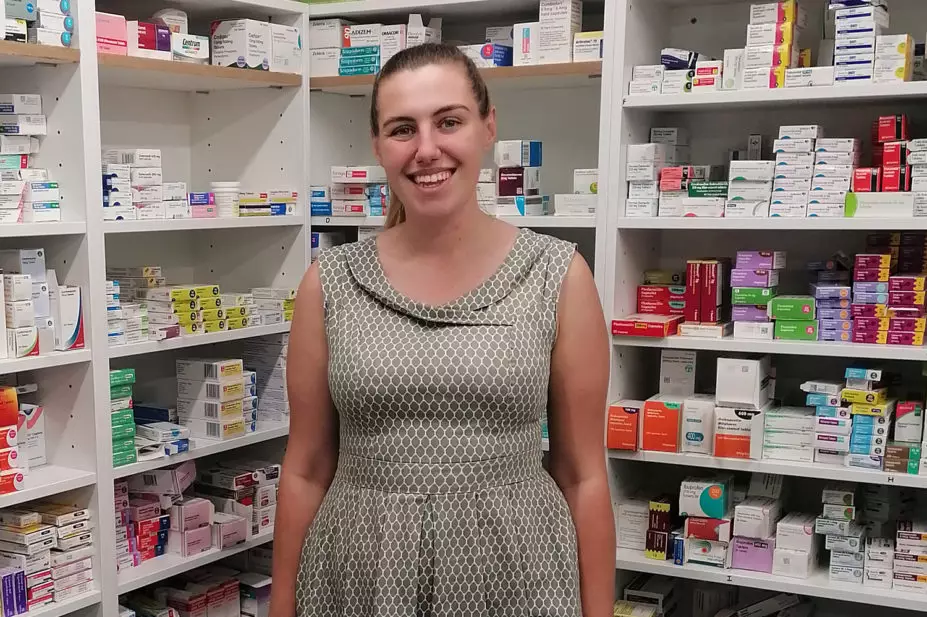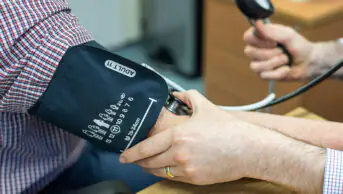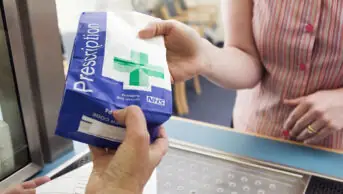
Lowri Haf Puw
Holidaymakers who become ill often find it difficult to access healthcare and may be passed between services. But for those visiting Gwynedd in Wales, as well as local residents, independent prescriber Lowri Haf Puw offers an invaluable service at the local pharmacy. She works across all five sites operated by the small local chain Ffeylleyr Llyn Cyf but most frequently in Llanbedrog and Criccieth.
“I had a patient last week who was away on holiday and they had been sent all over the place trying to see someone — they were 24 with a urine infection,” she says. She was able to prescribe for them, allowing them to continue their holiday. “They were extremely grateful.”
Haf Puw graduated from Cardiff University in 2017 and initially worked in a hospital pharmacy. When COVID-19 hit, she was working in an intensive care unit, which she found impacted on her mental health during the early part of the pandemic.
An approach by a former tutor led her to community pharmacy, where she had previously enjoyed placements during her undergraduate course. She took the independent prescriber course at Cardiff University and started prescribing for patients with acute conditions, and has recently joined the Welsh Pharmacy Board of the Royal Pharmaceutical Society.
We have developed quite a good rapport and relationship with the local GP surgery
Gwynedd is an area that has a shortage of GPs, so patients are glad of an alternative way to access care and GPs are relieved that some of the strain is taken off their overstretched services. “We have developed quite a good rapport and relationship with the local GP surgery,” she says.
And prescribing has changed Haf Puw’s preconceptions about hospitals being the route ahead for pharmacists who want to concentrate on the clinical side of the job.
“It is our job in primary care to avoid hospital admissions — to spot people early enough,” she says, adding that many hospital admissions are linked to failures in primary care. “Pharmacists are the most accessible of healthcare professionals for patients. It just makes sense to be able to offer this service.”
The result has been a satisfying job where she sees booked patients, as well as continuing with the normal duties of a community pharmacist. The presentations she sees vary tremendously but often are patients who would otherwise have had to make a GP appointment. She is helped with Welsh patients by access to their summary care records but does not have the same for English and Scottish ones.
As a pharmacist you are used to black and white and when you are a prescriber it is more of a grey area
Prescribing does require a certain shift in mindset, however. “As a pharmacist you are used to black and white and when you are a prescriber it is more of a grey area. Not all patients fit into a nice box. There is always [the thought] in the back of your mind ‘this is what I think it is but what else could it be?’” she says.
But lack of awareness that pharmacists can help concerns her. “It is [about] making the patient experience as streamlined as possible — that they don’t have to jump through all of these hoops to see a healthcare professional,” she says.
Haf Puw stresses that taking on prescribing is not just a route for ambitious young pharmacists. “I have come across pharmacists who have undertaken the independent prescribing course at 55 and felt it has given them a new lease of life,” she says. “It does take work but it is very rewarding and you see the benefits to the patients.”
Quick fire questions
- How many prescriptions do you write? “In a day, I would say five to six.”
- Do you do more prescribing or deprescribing? “It is nearly all prescribing. I have seen a couple of patients with side effects from medications where I have suggested they have a review with their GP.”
- Any regrets about qualifying as an independent prescriber? “I would not say it is a regret but on occasions I have been more stressed. It is just making sure that you have a process and follow it.”
- What is your favourite time of the working day? “When I get 10 to 15 minutes to do the clinical checks for the prescriptions which have arrived. It is knowing that that task has been ticked off. I get a cup of coffee and switch everything else off and just concentrate on the prescriptions.”
- How do you destress? “I try to compose myself! I do practise mindfulness but I am also in a choir and enjoy baking. It’s making sure there is a bit of joy in your life.”
- What makes your heart sink? “When an error has occurred in any sense. I’m glad it does not happen very frequently!”
- What makes your heart sing? “When patients are thankful. We had a lady come in yesterday with boxes of chocolates and a ‘thank you’ card! When that happens you forget about the other people who are angry and frustrated.”
Click here to return to ‘Meet the prescribers: pharmacists transforming care for patients’


